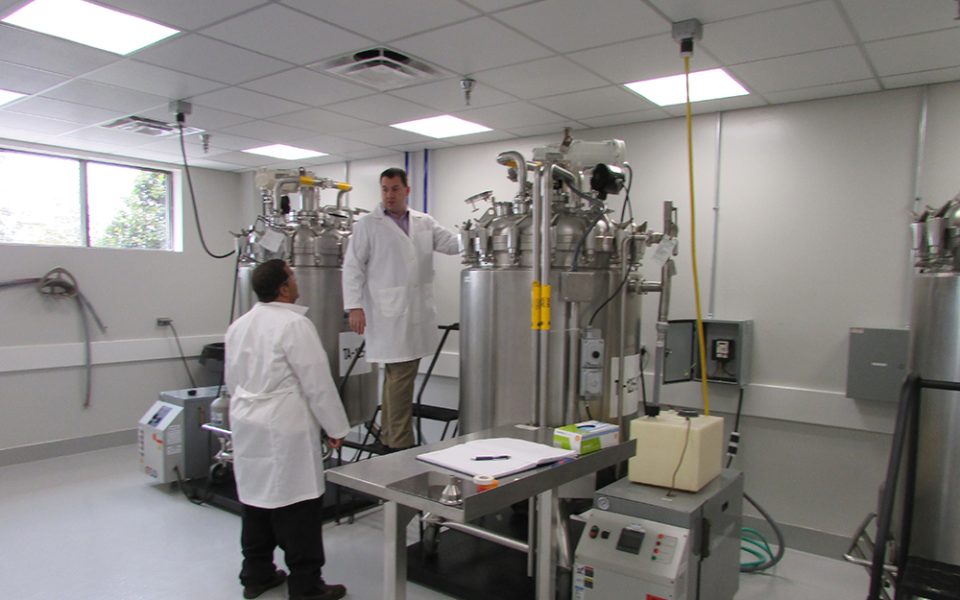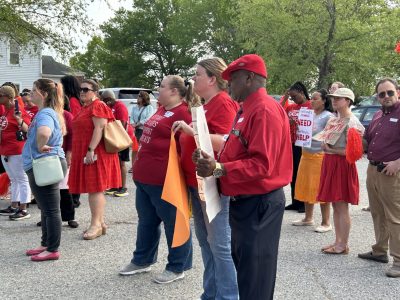by Jordan Green
The repurposed Whitaker Park, once RJ Reynolds’ flagship cigarette factory, gets its first tenant, a hair-care product manufacturer that uses a protein developed by a local biotech firm. The company, Reason To Believe, is taking over RJ Reynolds former lab, which was renovated with funds from the 1998 Master Settlement Agreement by cigarette manufacturers.
The fact that Alpha Keratin 60ku, the essential component in Reason To Believe’s hair-care product line, was developed by Wake Forest University cemented founder Melisse Shaban’s commitment to Winston-Salem when it came time for the company to open an ingredient manufacturing facility.
The fact that lab space was available in the repurposed Whitaker Park, a massive complex that was once RJ Reynolds Tobacco Co.’s flagship manufacturing facility near the university campus, was also a major selling point.
“It’s very interesting because you know it’s an old RJR facility that there’s an amazing amount of infrastructure,” Shaban said. “They have wet and dry areas. And it was quite stunning: It wasn’t the newest equipment you’ve ever seen, but there would be no way that we would be able to afford all of that on our own. They didn’t suffer from not having working capital at RJR. It was all in working order. It just needed to be dusted off, and to have some sage burned.”
Finally, the passage of HB2 by the state General Assembly reinforced Shaban’s desire to establish an inclusive work culture in Winston-Salem rather than deterring her company’s investment.
“We’re not running away from North Carolina,” said Shaban, whose company is headquartered in Raleigh. “We’re running to North Carolina because we believe we can affect things like HB2 by building jobs.”
She added that the company is committed to hiring veterans.
As the first tenant of the Whitaker Park Development Authority, Reason To Believe held its grand opening on April 21. The company currently employs seven people in ingredient manufacturing, quality control, product evaluation, process development and materials furnishing. Shaban said the company plans to take on additional space in the summer, and will likely double the size of its workforce by the end of the year. In the best-case scenario — or “nirvana,” as Shaban put it — she said Reason To Believe could be employing “a couple hundred people” at Whitaker Park in the next five years.
The Whitaker Park lab was running test pilots and calibrating machines last week. By the end of this week, Shaban said she expects the lab to be turning out product for the company’s new hair-care line.
Reason To Believe’s grand opening as the first tenant of the repurposed Whitaker Park is a seismic event for a city whose identity is closely tied to the once-mighty RJ Reynolds Tobacco. The massive facility due north of Lawrence Joel Veterans Memorial Coliseum and east of Wake Forest University was state of the art for the industry when it opened in 1961 as the flagship factory for a company that was then the largest cigarette manufacturer in the nation. Now largely vacant, the complex lines the pristine Reynolds Boulevard, covering more than 150 acres. The largest facility on the complex, Building 601-1, stretches the length of three conventional city blocks and covers 720,876 square feet, while nearby a dozen additional buildings with access to rail cover a combined 1.2 million square feet. The much smaller Building 630-2, which hosts Reason To Believe, was built in 1989 as RJ Reynolds Tobacco’s research and development lab. The plant closed around 2011, as Reynolds American completed the shift of its manufacturing workforce to a newer facility in suburban Tobaccoville.
“Whitaker Park generated thousands of jobs when it was booming,” Winston-Salem City Councilwoman Denise D. Adams, who represents the North Ward, where the facility is located, said in an interview. “I worked there as a tour guide during my summers in college. My brother worked there as a mechanic; he’s no longer alive. My brother-in-law worked there. We’re looking forward to bringing back that vibrancy; back when it was there, there were lots of mom-and-pop businesses and stores all over the North Ward. During lunchtime it was like downtown is today any day of the week.”
Adams added that virtually every family with longstanding ties to Winston-Salem had at least one member working for Reynolds at one time or another.
RJ Reynolds’ donation of part of the Whitaker Park — totaling more than 1.7 million square feet of space and about 125 acres — to the new Whitaker Park Development Authority is one of the largest corporate donations in the history of North Carolina. The development authority launched in 2011 as a partnership between Winston-Salem Business Inc., the Winston-Salem Alliance and Wake Forest University. The Golden Leaf Foundation, created to administer half of North Carolina’s share of the Master Settlement Agreement with tobacco manufacturers, awarded a $1.7 million grant to the development authority to renovate Building 630-2 and purchase equipment leased to Reason To Believe.
The technology for the ingredient processed by Reason To Believe at Whitaker Park — Alpha Keratin 60ku, a building block of hair, skins and nails — was developed by the Winston-Salem biotech firm KeraNetics through a $30 million research investment.
Shaban said at first she didn’t envision her company manufacturing the key ingredient, but eventually came to see that it would need to be part of their business strategy.
“Winston-Salem has done like places like upstate New York — it’s created scenarios and opportunities where it’s easily accessible for companies to get started,” she said. “They’ve created grants and opportunities; they’ve created terrific menus of options. They’ve done a terrific job: It’s not as though you have to go down one silo and things get tied up in red tape. They’ve made it very easy to do business.”
Shaban said that whether damaged hair is frizzy or thick and coarse, the protein carries a self-regulating capacity that addresses the specific need of each hair type.
“With the tens of millions of dollars that has been spent on this technology, this protein knows where to go,” she said. “It finds the damaged site, and where it’s not needed it washes out. The more damaged the hair is, the better the protein is.”
The keratin goes through about five stages at the Whitaker Park facility, from extracting the protein from bags of human hair in tanks that use centrifugal force to separate liquids from solids, purification of both powder and liquid concentrate products, quality control to ensure consistency, and research and development to optimize processes.
Erin Falco, head of research and development, showed off a series of humidity chambers during a tour of the facility last week. Falco tests different hair types with humidity set to mimic a typical North Carolina summer. The tests utilize hair with Reason To Believe’s product and competing products, along with the hair of someone who doesn’t use any product as a control.
“What’s really cool about our molecule is it comes from hair so it’s recognizable by hair,” Falco said. “So we can truly restore hair.”
Join the First Amendment Society, a membership that goes directly to funding TCB‘s newsroom.
We believe that reporting can save the world.
The TCB First Amendment Society recognizes the vital role of a free, unfettered press with a bundling of local experiences designed to build community, and unique engagements with our newsroom that will help you understand, and shape, local journalism’s critical role in uplifting the people in our cities.
All revenue goes directly into the newsroom as reporters’ salaries and freelance commissions.





Leave a Reply